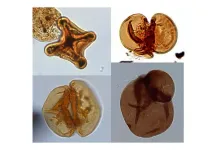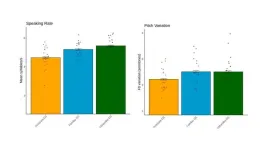(Press-News.org) Philadelphia, April 30, 2024 – A genetic propensity to higher circulating levels of lipids containing arachidonic acid, an omega-6 polyunsaturated fatty acid found in eggs, poultry, and seafood, has been found to be linked with a lower risk for bipolar disorder, according to a new study in Biological Psychiatry, published by Elsevier. This new evidence paves the way for potential lifestyle or dietary interventions.
Bipolar disorder is a debilitating mood disorder characterized by recurring episodes of mania and depression. Although its etiology is still unclear, previous studies have shown that bipolar disease is highly heritable. The findings of this study indicate a link between bipolar disorder and altered metabolite levels, supporting the notion that circulating metabolites play an important etiological role in bipolar disease and other psychiatric disorders.
Lead investigator David Stacey, PhD, Australian Centre for Precision Health, University of South Australia; UniSA Clinical and Health Sciences; and South Australian Health and Medical Research Institute, Adelaide, Australia, explains, “Accumulating evidence indicates a role for metabolites in bipolar disorder and other psychiatric disorders. By identifying metabolites that play causal roles in bipolar disorder, we hoped to be able to highlight potential lifestyle or dietary interventions."
By applying Mendelian randomization, a powerful causal inference method, the researchers identified 33 out of 913 metabolites studied present in the blood that were associated with bipolar disorder, most of them lipids.
Researchers also found that a bipolar disorder risk gene cluster (FADS1/2/3), which encodes enzymes associated with lipid metabolism, mediated the association between bipolar disorder and the levels of arachidonic acid and other metabolites.
Commenting on the findings, John Krystal, MD, Editor of Biological Psychiatry, says, "Arachidonic acid is typically a widely present omega-6 fatty acid in the body and brain that contributes to the health of cell membranes. This study provides a fascinating step forward in the effort to develop blood biomarkers of bipolar disorder risk, particularly in those patients with bipolar disorder and risk gene variations in the FADS1/2/3 gene cluster.”
Dr. Stacey notes, "Intriguingly, we observed a pattern whereby a genetic propensity to higher levels of lipids containing an arachidonic acid fatty acid side chain was associated with a lower risk of bipolar disorder, while the inverse was true of lipids containing a linoleic acid side chain. Since arachidonic acid is synthesized from linoleic acid in the liver, this suggests arachidonic acid synthesizing pathways are important for bipolar disorder."
Given its presence in human milk, arachidonic acid is considered essential for infant brain development and is added to infant formula in many countries. Therefore, it may exert an effect on bipolar disorder risk by affecting neurodevelopmental pathways, which would be consistent with contemporary views of bipolar disorder as a neurodevelopmental disorder. Arachidonic acid can be sourced directly from meat and seafood products or synthesized from dietary linoleic acid (e.g., nuts, seeds, and oils).
Dr. Stacey concludes, "To our knowledge, ours is the first study to highlight a potential causal role between arachidonic acid and bipolar disorder. Preclinical studies and randomized controlled trials will be necessary to determine the preventive or therapeutic value of arachidonic acid supplements, perhaps with a particular focus on people with a compromised arachidonic acid synthesizing pathway or with poor natural dietary sources. Our findings also support potential avenues for precision health interventions focused on early life nutrition to ensure that infants and children are receiving enough arachidonic acid and other polyunsaturated fatty acids to support optimal brain development, which may also reduce the risk of bipolar disorder."
END
An omega-6 fatty acid may reduce the risk for bipolar disorder
A study published in Biological Psychiatry focuses on the role arachidonic acid plays in bipolar disorder, paving the way for potential lifestyle or dietary interventions
2024-04-30
ELSE PRESS RELEASES FROM THIS DATE:
New breast cancer screening recommendations aim to address health inequities, especially among Black women
2024-04-30
In an effort to improve early detection of breast cancer and address disparities in outcomes, the US Preventive Services Task Force (USPSTF) has issued updated breast cancer screening recommendations to now advise all women to undergo routine screening every other year starting at age 40 —representing a significant shift from previous guidelines, which recommended screening starting at age 50 and engaging in individualized decision-making for women aged 40 to 49.
The revised guidelines aim to enhance early detection of breast cancer and tackle disparities in breast cancer mortality, particularly among Black women, who are more likely to have aggressive ...
AGS honors expert and emerging geriatrics leaders at 2024 virtual annual scientific meeting (#AGS24)
2024-04-30
New York (April 30, 2024) – The American Geriatrics Society (AGS) annually honors researchers, clinicians, educators, and emerging health professionals who have made outstanding contributions to high-quality, person-centered care for older adults. This year’s award recipients include 19 leaders representing the breadth of medical disciplines championing care for us all as we age.
Choosing Wisely Champion Award
Paras Goel, PT, DPT, Med, MBA, GCS
Clinical Student Research Award
Elizabeth Margaret Ann Kelly
Clinician of the Year Award
Joyce Fogel, MD
David ...
Protecting endangered monkeys from poachers, habitat loss
2024-04-30
COLUMBUS, Ohio – The Tai Forest Monkey Project has operated a research field station in west Africa’s Ivory Coast for 30 years, but on the one day since its opening that the site was unstaffed because of conflict in nearby Liberia, poachers took advantage – and killed 18 endangered monkeys.
The anecdote is a telling example, scientists say, of how thousands of field stations studying primates in forests around the world not only generate knowledge about these threatened species, but also contribute to ...
China’s bid to decarbonize may have hidden costs
2024-04-30
ITHACA, N.Y. – Environmentalists rejoiced when China announced its commitment to reach carbon neutrality by 2060, but the decarbonization of China – which emits 27% of global carbon dioxide and a third of the world’s greenhouse gases – may come with hidden costs and hard environmental choices, according to new research.
In a paper published in Communications Earth & Environment, Stefano Galelli, associate professor at Cornell University’s School of Civil and Environmental Engineering, and colleagues attempt to quantify how decarbonizing the China Southern Power Grid, which provides electricity ...
Climate change and mercury pollution stressed plants for millions of years
2024-04-30
The link between massive flood basalt volcanism and the end-Triassic (201 million years ago) mass-extinction is commonly accepted. However, exactly how volcanism led to the collapse of ecosystems and the extinction of entire families of organisms is difficult to establish. Extreme climate change from the release of carbon dioxide, degradation of the ozone layer due to the injection of damaging chemicals, and the emissions of toxic pollutants, are all seen as contributing factors. One toxic element stands out: ...
Stowers Institute for Medical Research appoints new Assistant Investigator
2024-04-30
KANSAS CITY, MO—April 30, 2024—The Stowers Institute for Medical Research announces the appointment of Kamena Kostova, Ph.D., as its newest Principal Investigator. Kostova, an accomplished cellular and molecular biologist, will join the Institute in Fall 2024 as an Assistant Investigator. She brings with her an established research program focused on understanding cellular responses to ribosome breakdown and the relationship these responses have with complex diseases such as cancer and neurodegeneration.
Kostova is currently ...
Science council: “Tasks excellently fulfilled”
2024-04-30
The German Science and Humanities Council (Science Council) assessed the German Fed-eral Institute for Risk Assessment (BfR) in Berlin on 7 and 8 November 2023 and published its assessment today, 22 April 2024. As the highest German scientific commission, it certi-fies that the BfR “fulfills tasks of great social relevance” (protection of human health, in-forming the public about health risks posed by chemicals and biological substances) “on the basis of very good research”. It is characterised by an “extremely rapid response capability, a pronounced application orientation and a high degree of being up-to-date with its topics”. “We are delighted ...
USC-led study introduces a new and improved way to grow the cells that give rise to the kidney’s filtration system
2024-04-30
In a new study published in Cell Stem Cell, USC scientists report significant progress in cultivating nephron progenitor cells (NPCs), the cells destined to form the kidney’s filtration system, the nephrons. NPCs hold immense promise for understanding kidney development, modeling diseases, and discovering new treatments.
“By enhancing our capability to grow NPCs from human stem cells, we create a new avenue for understanding and combating congenital kidney diseases and cancer,” said corresponding and lead author Zhongwei Li, an assistant professor of medicine, and stem cell biology and regenerative medicine ...
USPSTF recommendation statement on screening for breast cancer
2024-04-30
Bottom Line: The U.S. Preventive Services Task Force (USPSTF) recommends biennial screening mammography for women ages 40 to 74. The USPSTF concludes that the current evidence is insufficient to assess the balance of benefits and harms of screening mammography in women 75 years or older. The USPSTF concludes that the current evidence is insufficient to assess the balance of benefits and harms of supplemental screening for breast cancer using breast ultrasonography or magnetic resonance imaging (MRI) in women identified to have dense breasts on an otherwise negative screening mammogram. Among ...
Machine listening: Making speech recognition systems more inclusive
2024-04-30
WASHINGTON, April 30, 2024 – Interactions with voice technology, such as Amazon’s Alexa, Apple’s Siri, and Google Assistant, can make life easier by increasing efficiency and productivity. However, errors in generating and understanding speech during interactions are common. When using these devices, speakers often style-shift their speech from their normal patterns into a louder and slower register, called technology-directed speech.
Research on technology-directed speech typically focuses on mainstream varieties of U.S. English without considering speaker groups that are more consistently ...
LAST 30 PRESS RELEASES:
Scientists deliver new molecule for getting DNA into cells
Study reveals insights about brain regions linked to OCD, informing potential treatments
Does ocean saltiness influence El Niño?
2026 Young Investigators: ONR celebrates new talent tackling warfighter challenges
Genetics help explain who gets the ‘telltale tingle’ from music, art and literature
Many Americans misunderstand medical aid in dying laws
Researchers publish landmark infectious disease study in ‘Science’
New NSF award supports innovative role-playing game approach to strengthening research security in academia
Kumar named to ACMA Emerging Leaders Program for 2026
AI language models could transform aquatic environmental risk assessment
New isotope tools reveal hidden pathways reshaping the global nitrogen cycle
Study reveals how antibiotic structure controls removal from water using biochar
Why chronic pain lasts longer in women: Immune cells offer clues
Toxic exposure creates epigenetic disease risk over 20 generations
More time spent on social media linked to steroid use intentions among boys and men
New study suggests a “kick it while it’s down” approach to cancer treatment could improve cure rates
Milken Institute, Ann Theodore Foundation launch new grant to support clinical trial for potential sarcoidosis treatment
New strategies boost effectiveness of CAR-NK therapy against cancer
Study: Adolescent cannabis use linked to doubling risk of psychotic and bipolar disorders
Invisible harms: drug-related deaths spike after hurricanes and tropical storms
Adolescent cannabis use and risk of psychotic, bipolar, depressive, and anxiety disorders
Anxiety, depression, and care barriers in adults with intellectual and developmental disabilities
Study: Anxiety, gloom often accompany intellectual deficits
Massage Therapy Foundation awards $300,000 research grant to the University of Denver
Gastrointestinal toxicity linked to targeted cancer therapies in the United States
Countdown to the Bial Award in Biomedicine 2025
Blood marker from dementia research could help track aging across the animal world
Birds change altitude to survive epic journeys across deserts and seas
Here's why you need a backup for the map on your phone
ACS Central Science | Researchers from Insilico Medicine and Lilly publish foundational vision for fully autonomous “Prompt-to-Drug” pharmaceutical R&D
[Press-News.org] An omega-6 fatty acid may reduce the risk for bipolar disorderA study published in Biological Psychiatry focuses on the role arachidonic acid plays in bipolar disorder, paving the way for potential lifestyle or dietary interventions



